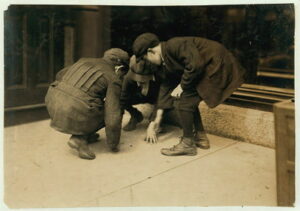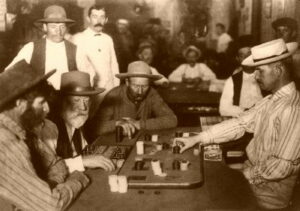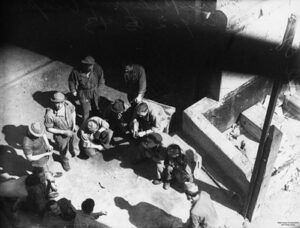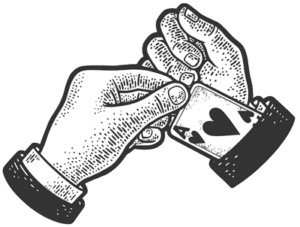Head onto the streets of London nowadays and, if you’re in one of the tourist areas, there’s a good chance that you’re going to be faced with people trying to take your money. You will doubtless see some poor sap offering their money up to a dealer with three cards laid on a cardboard box trying to find the Queen or some other game.
Those are not the sort of thing that we’re talking about here. Instead, we’re looking at the old-school games that people would play against friends on the streets, engaging in friendly attempts to take small amounts of money from one another.
Some of them are variations on the kinds of games that you can play in a casino, with there often being a distinct lack of clarity over which version of the game came first. Most of them, though, are not games that casinos will be interested in for the simple reason that they’re usually played with odds of 1/1, meaning that there is no House Edge to guarantee anyone a profit.
That is fine if you’re just playing a friendly game with some mates, but it’s not that useful if you’re trying to turn a profit in the way that casinos do. They need games like the street urchins play against tourists, but that’s not what we’re interested in.
Penny Pitching
 When it comes to friendly games played for money, there isn’t much of a friendly amount than a one pence piece. Mates playing penny pitching would gather as many pennies as they could, or at least as many as they wanted to play with, then find a suitable wall to use for the purpose of their game. Then players would take it in turns to throw their penny against the wall, with the penny that landed closest to the wall being the one that won the game. That player would be able to claim all of the pennies thrown in that round, with the players deciding beforehand how many each would throw.
When it comes to friendly games played for money, there isn’t much of a friendly amount than a one pence piece. Mates playing penny pitching would gather as many pennies as they could, or at least as many as they wanted to play with, then find a suitable wall to use for the purpose of their game. Then players would take it in turns to throw their penny against the wall, with the penny that landed closest to the wall being the one that won the game. That player would be able to claim all of the pennies thrown in that round, with the players deciding beforehand how many each would throw.
Despite the fortuitous nature of the manner in which pennies will respond to being thrown against a wall, this was a game of skill and you could learn how to get your penny to stop virtually right next to the wall with enough practice. As a result, you would be unlikely to win very often if you were playing the game against someone that had more skill at it than you. In many ways, therefore, this game was one of the best representatives of what it is like to go up against the House. As a game, it certainly isn’t played as much as it was in the days before computer games and the likes.
That being said, you can still find some kids playing it. On occasion, you might stumble across a group of friends playing a penny pitching tournament. The idea behind that is that everyone taking part starts with the same amount of coins and the tournament goes on until one person has all of the coins. It was played by Ancient Greek children using bronze coins, so it is fair to say that there is a long history of penny pitching as a concept. Whilst it isn’t played much, it is one of there games that you’ll often find on a list of inexpensive things that you can do with children to keep them entertained.
Faro
 A game that can be seen in Westerns such as Tombstone, Faro was once a casino game but isn’t offered in them anymore. Instead, it is the ideal sort of game for kids to play on a street on a hot summer’s day, when it is too warm to be running around with a football or sat inside on the PlayStation. One of each of the 13 cards in a deck is laid out on the floor next to each other. Players then place bets on the cards of their choice, with one player acting as the Banker. It is their job to deal the cards out and, once all bets have been placed, two cards face up.
A game that can be seen in Westerns such as Tombstone, Faro was once a casino game but isn’t offered in them anymore. Instead, it is the ideal sort of game for kids to play on a street on a hot summer’s day, when it is too warm to be running around with a football or sat inside on the PlayStation. One of each of the 13 cards in a deck is laid out on the floor next to each other. Players then place bets on the cards of their choice, with one player acting as the Banker. It is their job to deal the cards out and, once all bets have been placed, two cards face up.
The first card is the dealer’s card and the second is the players’. Any bets placed on the card that corresponds to the banker’s card are collected in by the banker, whilst bets placed on the players’ card are paid out on a 1/1 basis. That is what makes the game a friendly one, with no ‘take’ to anyone being higher than the other person. If the two cards dealt by the banker are the same, the banker takes half of the money bet on that card and the other half is returned to the players. It is a simple game, but one that provides the players with a lot of fun and a chance to learn about gambling as a concept.
The interesting thing about Faro is that, in many ways, it is the ideal sort of game for a casino. It is easy enough to see how a casino could set that up in order to take a regular House Edge, which is exactly why it was a game that would be played in casinos of old. Yet it has all but disappeared from casinos nowadays, being limited in its appearance to street games such as we’re talking about. At some point, some clever casino owner will realise that there is a chance that they can make money from it and will bring it back, but for now it remains somewhat innocent in its nature.
Street Craps

When it comes to games that have a close link to casinos, none are more obvious than street craps. This game works in a similar way to actual craps, with the major difference being that it is much more simplified. On top of that, no one has an Edge, making it the definition of a friendly game. Each player takes a turn throwing two dice against a wall or a curb on the street. They players bet against one another, with the person throwing the dice deciding how much to bet and which of two possible options they think will be the outcome of the throw: Pass or Don’t Pass.
If they opt for Pass then that means that they will win depending on certain circumstance. If the opening roll comes to a combined amount of either 7 or 11, the thrower wins. If it is worth 2 or 12, the thrower loses. Anything else creates what is known as a ‘point’. When a point is created, the thrower throws again until they either roll the ‘point’ or else they roll a seven. If they manage to throw the ‘point’ again then they win, whereas if they roll a 7 then they lose.
Should the thrower choose Don’t Pass, they will lose if the first throw is either 7 or 11. If it is worth 2 or 12, they win. Once more, any other throw of the dice results in a ‘point’ being created. The thrower then wins if they manage to throw a 7, but they lose if they throw the ‘point’ again before they throw a 7. Meanwhile, the other players can choose whether to split the bet against the thrower or one player alone can accept the bet. Other players can also bet against each other about the outcome of the rolls if they want to place a series of side wagers.
Acey-Deucey
 This game can be known by various names, but whatever it’s called the rules remain largely the same. It is a simple game, which again has no Edge. Using a full deck of cards, each player places an ante bet into the central pot. Players then take turns from left to right and can add any amount they wish to, up to the total that has been placed in the pot. The cards are tanked from a low of two, all the way up to an Ace, which is high. The dealer for the game deals two cards, with the player betting. After that, a third card is turned over. If the third card comes between the first two, the player wins the amount they wagered from the central pot.
This game can be known by various names, but whatever it’s called the rules remain largely the same. It is a simple game, which again has no Edge. Using a full deck of cards, each player places an ante bet into the central pot. Players then take turns from left to right and can add any amount they wish to, up to the total that has been placed in the pot. The cards are tanked from a low of two, all the way up to an Ace, which is high. The dealer for the game deals two cards, with the player betting. After that, a third card is turned over. If the third card comes between the first two, the player wins the amount they wagered from the central pot.
If the third card isn’t between the two cards, the player’s wager gets added to the pot. If it is the same as either of the first two cards, the player has to pay in double their stake to the pot. Once all of the money from the pot has been won, the players place another ante and the game starts again. Whilst the game is essentially friendly in nature, stakes need to be kept low in order to ensure that everyone gets to enjoy playing it. Some players can go big with their bets, putting a lot of money at risk and make the game a lot less fun for the others, which is worth bearing in mind.
Again, this feels like the sort of game that a casino could find a way of introducing a House Edge to and make money from. If that ever happens, you’d do well to steer clear of it considering the manner in which the stakes can get raised at a rapid rate. Instead, it is best played as a friendly game between mates, which is why pennies will always be the best possible stake amount. Acey-Deucey is easy to learn how to play because of its simplistic nature, but that doesn’t mean that it isn’t fun. As players get into it and begin to raise their stakes it can become really exciting.